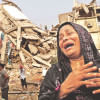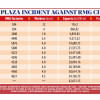RMG notably safer now: ILO
Bangladesh has made impressive strides in making workplace safe in the garment sector in recent years as factory owners strengthened safety as per proposals of international brands and retailers, said union leaders, analysts, the ILO, and entrepreneurs.
After the Rana Plaza building collapse, the Accord, a platform of Europe-based retailers and brands, and the Alliance, the North America-based retailers and brands' forum, were formed to fix the fire, electrical and structural loopholes in the garment factories in Bangladesh.
"The garment industry in Bangladesh has become notably safer since the Rana Plaza collapse six years ago," said Tuomo Poutiainen, country director of the International Labour Organization (ILO).
Within months of the tragedy, the Bangladesh Labour Act 2006 was amended with revisions on occupational health and safety and provisions to provide workers with a greater voice, through freedom of association and collective bargaining rights.
"Quite a lot has happened since then and we now see many of the initiatives, laws and policies started taking root in the RMG industry making it a safer industry to work and invest in," Poutiainen told The Daily Star.
"While more is needed, workers are more aware of their rights and responsibilities and can increasingly raise alarm on health and safety concerns in their place of work."
According to Poutiainen, since 2015, several thousand export-orientated factories have been inspected and many thousands of factory workers were educated on fire and building safety. The critical importance of early detection, working fire alarms, and safe exit routes have been emphasised.
"Accord engineers have verified that approximately 225 Accord-covered factories have completed safety remediation of fire, electrical, and structural safety hazards from Accord's initial inspections," Rob Wayss, executive director of the Accord for Bangladesh operations, said in a mail on March 31.
"Fire, electrical, and structural safety has improved very substantially at the Accord-covered factories since the start of the inspections, remediation, and workplace safety programmes of the Accord in November 2013."
He says there is still remediation and workplace-based safety work that needs to be completed at most of the supplier factories covered by the Accord. There is also a substantial amount of remediation of safety hazards that needs to be completed at the factories which the Remediation Coordination Cell, the Department of Inspection for Factories and Establishments, and the National Plan of Action are focused on.
Approximately 90 percent of the safety hazards identified through the Accord inspections have been remediated.
"Please note this percentage figure includes the safety hazards that supplier factories have reported as fixed and those which the factory has reported and Accord engineers have verified are properly fixed." About 18 percent of the items that are reported as fixed are found not to be fully and/or not properly fixed when Accord engineers conducted the verification inspections, Wayss said.
Nazma Akter, president of Sammilito Garment Sramik Federation, a garment workers' rights group, also praised the improvement: "No major industrial incidents have taken place since 2013 which indicates that the safety improved a lot in the garment sector."
She says the workers are well aware about their safety and rights. However, the government and the private sector need to continue the monitoring so that the safety is not affected.
Khondaker Golam Moazzem, research director of the Centre for Policy Dialogue, says a lot of positive and qualitative changes have taken place in the garment sector after the Rana Plaza collapse. Some important institutions related to labour rights have been strengthened.
However, the positive changes should be made sustainable for further growth of the sector, he said. Rubana Huq, the newly elected president of the Bangladesh Garment Manufacturers and Exporters Association, pledged that the good work will continue.
"It is in our own interest that we will be sustaining these improvements in our own factories. Since huge investments have been made, it is only natural for us to continue with the safety protocols set in our industry."
"In fact, it is time for us to engage in self-monitoring."

 For all latest news, follow The Daily Star's Google News channel.
For all latest news, follow The Daily Star's Google News channel. 








Comments